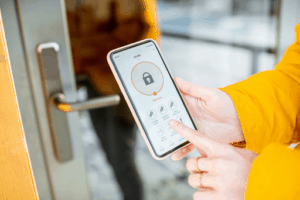The Rise and Fall of Physical Keys - What You Need to Know

As we welcome in the new year, it’s important to remain open to change and new possibilities. For those of us in the lock industry, this change comes in the form of keyless locks. We’ve long known that keys are pesky objects: they can break, get lost, or are a flat-out pain to locate when you need to get inside in a hurry. The solution? Keyless electronic locks that either require a keypad code or authentication via smartphone app to gain entry. These new, high-tech locks have risen in popularity in recent years, but even though they eliminate many issues associated with traditional key locks, they may not be the best option for your home. Read on to learn more about keyless locks and see if they’re the solution to your security needs.
Are keys dead?
In short, yes and no. Electronic locks are relatively new, and the vast majority of homes and apartments in America are still fitted with traditional “pin and tumbler” or deadbolt locks. You’re far more likely to see electronic locks on cars than residences, but the invention is quickly gaining traction.
As mentioned above, keyless locks were created as a solution to the problems associated with key locks. Rather than relying on a key to turn and release a door’s locking mechanism, today’s most popular electronic locks — keypad locks, smart locks, and biometric locks — are equipped with motors buried within the door itself. The motor is connected to the lock’s bolt or cylinder, activating only when stimulated by an electrical impulse. For keypad locks, this impulse is triggered when the correct code is entered, smart locks activate through a remote sensor, and biometric locks open when an approved fingerprint is scanned.
At this time, however, electronic locks are still in their infancy. Only time will tell if traditional metal keys will endure these innovations.

Advantages and Disadvantages of Keyless Locks
As a home or business owner, you should stay aware of security trends to ensure that your residence is as protected as it could be against outside threats. Part of this awareness is knowing when your current locks are outdated. But even if your locks need to be replaced, keyless locks may not be right for you. Let’s take a look at the pros and cons:
- Advantages: The good news with electronic locks is that you no longer need to worry about losing your keys! That’s one less thing to keep track of, or possibly break. Additionally, as long as you have a free hand, keyless locks make for easy entry since you need only punch in a code or open an app to unlock your door. Smart locks are particularly convenient if you need to let someone in while away: the majority of app-controlled locks on market allow for remote operation, meaning you can lock and unlock the door from anywhere. As for security, electronic locks offer an array of benefits. For one, they’re nearly pick-proof since the lock won’t turn unless triggered by an electrical impulse. You also don’t risk intruders gaining entry through using a spare key. Traditional “pin and tumbler” locks aren’t nearly as secure: over time, criminals have discovered a fool-proof way to pick these locks using lock bumpers. If break-ins are a frequent problem in your area, electronic locks will offer greater protection overall.
- Disadvantages: Having an electronic lock doesn’t always guarantee an easy entry. For keyless locks, forgetting your key-code, losing your phone, or weak internet connection as all can prevent the door from unlocking — and you can’t turn to a spare key for help. Power outages create unique issues as well: since the lock is controlled through electrical impulse, a power failure can result in the door remaining locked or unlocked until the power is restored. For either of these lock-out scenarios, it’s worth mentioning that, ironically, some electronic locks have a back-up key lock in case of emergencies. (See the above for all the reasons why this is a problem.) Although electronic locks can’t be easily picked, if your access code or phone falls into the wrong hands, intruders can enter your home damage-free and just as easily as if they found a spare key. With keyless car locks, there have also been instances where the locks were hacked, though it’s still uncertain if this will become a big problem for residential electronic locks as well.

Pop-A-Lock Can Handle It
No matter your lock needs, Pop-A-Lock’s expert technicians can take care of the job. We can install electronic or high-security locks quickly, at minimal cost. Just call us to get a free quote! If you’re still undecided on which lock will best suit your home’s needs, give us a call anyway. We’re always free to chat locks and help you choose.









